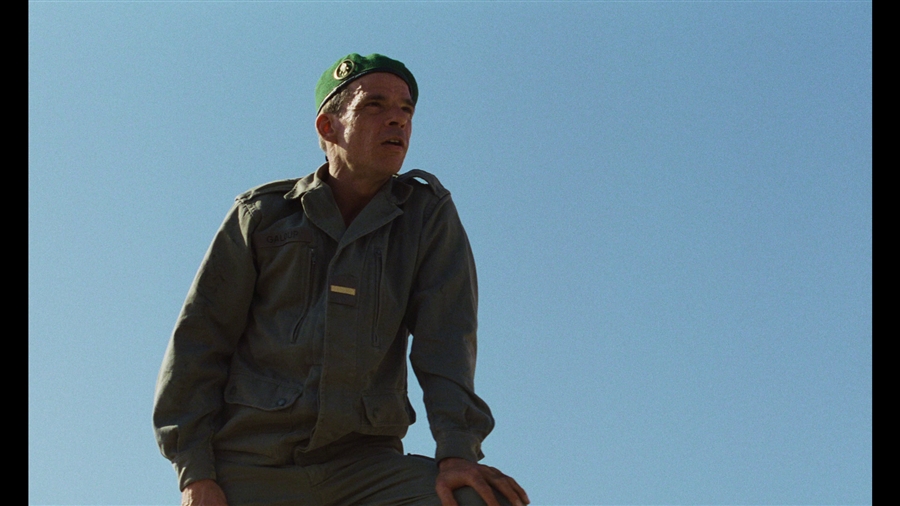Beau travail

See more details, packaging, or compare
Synopsis
With her ravishingly sensual take on Herman Melville’s Billy Budd, Sailor, Claire Denis firmly established herself as one of the great visual tone poets of our time. Amid the azure waters and sunbaked desert landscapes of Djibouti, a French Foreign Legion sergeant (Denis Lavant) sows the seeds of his own ruin as his obsession with a striking young recruit (Grégoire Colin) plays out to the thunderous, operatic strains of Benjamin Britten. Denis and cinematographer Agnès Godard fold military and masculine codes of honor, colonialism’s legacy, destructive jealousy, and repressed desire into shimmering, hypnotic images that ultimately explode in one of the most startling and unforgettable endings in all of modern cinema.
Picture 10/10
Unavailable in North America for a long while, The Criterion Collection presents Claire Denis’ Beau travail on Blu-ray in its original aspect ratio of 1.66:1 on a dual-layer disc. Encoded at 1080p/24hz, the high-definition presentation comes from a brand new 4K restoration scanned from the 35mm original camera negative.
I never saw the New Yorker disc, but given their track record, at least with their stuff from the early days of DVD, I’m sure it wasn’t good. Either way, this looks absolutely extraordinary. The final presentation is so vibrant and crisp, just loaded with details. Every fine rock and pebble in the desert setting, every mark on Denis Lavant’s face, every crystal in that salted beach late in the film, all of it comes to vivid life with incredible texture. Film grain is present, very fine, but visible and cleanly rendered, providing that film-like look.
The film is surprisingly colourful, particularly in the night club sequences, and those colours look just spectacular, with wonderful reds, purples, blues, and more. Some scenes get tinted a bit to lend to the scene (nighttime or early morning shots for example) but colours stay mostly natural; it was so nice to see a new 4K restoration that hasn't been heavily tinted a yellow or teal. Black levels are pretty rich and inky, though shadows can get eaten up a little in the nighttime sequences and clubbing shots. This proabably has more to do with lighting and such, rather than anything to do with the restoration or encode (in one of the supplements director of photography Agnès Godard mentions they tried to use available light). The print is also just about spotless. The end results really are incredible.
(I’ll also just throw in there, even though no one asked, that it’s a true shame this is not receiving a 4K UHD release.)








































Audio 8/10
The film comes with a rather robust stereo soundtrack, presented here in lossless PCM. There is very little dialogue in the film, most of it delivered through narration, but when it appears it sounds clear and lively. Music is pretty heavy in the film, whether through the film's score or within a scene, and varies between what I believe is music from the Billy Budd opera (the film is loosely inspired by the story) and club music like Corona’s Rhythm of the Night. But whatever it is range is incredible and dynamic, fidelity is superb, and the audio does spread nicely in the environment, the opera music having a deep ethereal effect at times. A 5.1 remix would have been pretty effective I think, but it still sounds great as-is.
Extras 8/10
Though COVID-19 and other world issues obviously impacted this release based on how the features are presented, Criterion has managed to put together an incredibly insightful and scholarly edition for the film. Things start off with a video conferenced discussion about the film between directors Barry Jenkins and Claire Denis, both from their homes (I love that Denis is just sitting on the floor in front of her computer). The call took place shortly after the George Floyd protests started in Minneapolis and the two do have that on their minds as they discuss the film, at least when talking about some of the themes in the film (from protest to colonialism) and the actions of certain characters. On top of this Denis gets into the inspiration behind the film, and its production, which called for working with the French Foreign Legion, who were hesitant about the film, though more about the homosexual undertones rather than anything else. Jenkins also offers his own appreciation for the film and how the film had inspired him and his own work, mentioning how he watched it again after completing filming on Moonlight. I’m sure it was a bit of an awkward undertaking doing the interview this way but they make it work. It runs 28-minutes.
Criterion did manage to get two in-person interviews with actors Denis Lavant and Grégoire Colin, running 29-minutes and 17-minutes respectively. Colin recalls the experience as though he had actually been with the Legion, talking about the drills, training, and even having to deal with the locals in the Djibouti village they were filming around, who would think they actually were Legionnaires. Lavant’s fairly energetic during his, recounting meeting Claire Denis (sounds as though it was through Leos Carax at a party) and then the intense process of developing the character as they filmed (Lavant states at one point that handling a rifle helped in this department). He also talks about the film’s final sequence and how he was thinking about the character while filming that moment. They’re both in-depth interviews with great personal insights into their respective characters.
Next is a 21-minute audio interview with director of photography Agnès Godard, done over conference software and presented as a select-scene commentary. Godard talks over the sequences, recalling how they scouted locations around Djibouti, the decisions about using natural and/or available light, properly framing, shooting in the clubs, and so forth.
Following this is a video essay by film scholar Judith Mayne called Beau travail and the Dance Floor. This is a rather decent 28-minute deconstruction of the film, looking at how Denis builds and edits sequences, introduce and build characters, and plays with expectations. I think her analysis of the night club sequences were most rewarding along with the significance of the Rahel character, played by Marta Tafesse Kassa. She also examines the motion and editing of the training sequences, goes over elements that can be found in some of Denis’ other films, and also talks about the significance of Michel Subor’s appearance (and I admit I completely missed the painfully obvious reference to Le petit soldat). All-in-all, it’s a strong academic feature, the type that has been disappointingly absent from a lot of Criterion’s releases lately.
An essay by critic Girish Shambu, found in the included poster insert, then closes off the release. Though it ultimately doesn’t look like a lot of material, I found it all rewarding and very thorough, and they're one of the more satisfying collection of features I've come across lately.
Closing
Criterion does Claire Denis' landmark film justice with a gorgeous new presentation and a collection of supplements that look at the film from all angles.







